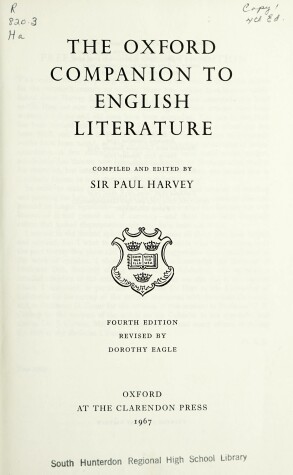Oxford Companions
1 total work
Sir Paul Harvey's original Oxford Companion to English Literaure, published in 1932, was the book that began Oxford's celebrated Companion series. In its various editions in the half-century since then, it has enjoyed an enormously faithful following and unflagging sales (over 400,000 to date). Now, for the Fifth Edition, the eminent novelist and biographer Margaret Drabble has put together the most substantial and significant revision in the book's distinguished history.
The Classic Guide to English Literary Culture
Here, thoroughly updated, is the standard reference work on English literature, both clasic and contemporary. The virtues established by Harvey are intact: the useful plot summaries, the separate entries on important fictional characters, the countless biographical articles on authors and other important figures in the world of letters, the lightness of touch that makes the book a pleasure to read. As ever, this is an essential book for libraries large and small, for students, for teachers, for everyone interested in English literature.
Revisions Deepen and Widen Book's Appeal
Drabble's revisions not only bring the volume up to date; they both deepen and widen its appeal. Topics once regarded as non-literary--detective stories, science fiction, children's literature, comic strips, for example--are now included, as are numerous foreign language authers who have become well-known in translation. There are also entries on composers who have adapted English texts to musical forms and articles on visual artists whose work has been touched by the English literary consciousness. The book covers all the important movements and critical theories (including the latest developments in Freudian and Marxist criticism and Saussurean linguistics and its successors). What is more, the entries on classic works--Beowulf, The Canterbury Tales, The Faerie Queen, and many others--now incorporate the findings of the latest scholarship. In still another innovation, the entries now offer the reader a guide to turther study and research by referring to the relevant biographies, memoirs, critical studies, and standard scholarly editions of many of the important works. Also, the book's appendices on censorship, copyright, and the calendar have been updated, and an exhaustive cross-referencing system in the manner of the more recent Companiions has been adopted.
About the Editor:
Margaret Drabble's many books include The Middle Ground, The Realms of Gold, The Ice Age, Thank You All Very Much, and A Writer's Britain.
Standard Features:
Among the many notable features distinguishing The Oxford Companion to English Literature are:
. Alphabetically arranged entries
. Entries on important individual works
. Author entries that include concise biographical information and cite their major works
. Many entries on historians, critics, philosophers, and booksellers
. Coverage of many American authors and of foreign language authors famous in translation
. Entries on non-literary figures famous in a literary context, from Penelope Rich to Ottoline Morrell
. Articles on literary societies, clubs, and coffee houses
. Definitions of literary and artistic movements, from Existentialism to the New Criticism, from Neo-classicism to Structuralism
. Entries on prizes, periodicals, newspapers, and literary agents
. Updated appendices on censorship, copyright, and the calendar
. Extensive system of internal cross references, redesigned in the manner of the more recent Companions"
The Classic Guide to English Literary Culture
Here, thoroughly updated, is the standard reference work on English literature, both clasic and contemporary. The virtues established by Harvey are intact: the useful plot summaries, the separate entries on important fictional characters, the countless biographical articles on authors and other important figures in the world of letters, the lightness of touch that makes the book a pleasure to read. As ever, this is an essential book for libraries large and small, for students, for teachers, for everyone interested in English literature.
Revisions Deepen and Widen Book's Appeal
Drabble's revisions not only bring the volume up to date; they both deepen and widen its appeal. Topics once regarded as non-literary--detective stories, science fiction, children's literature, comic strips, for example--are now included, as are numerous foreign language authers who have become well-known in translation. There are also entries on composers who have adapted English texts to musical forms and articles on visual artists whose work has been touched by the English literary consciousness. The book covers all the important movements and critical theories (including the latest developments in Freudian and Marxist criticism and Saussurean linguistics and its successors). What is more, the entries on classic works--Beowulf, The Canterbury Tales, The Faerie Queen, and many others--now incorporate the findings of the latest scholarship. In still another innovation, the entries now offer the reader a guide to turther study and research by referring to the relevant biographies, memoirs, critical studies, and standard scholarly editions of many of the important works. Also, the book's appendices on censorship, copyright, and the calendar have been updated, and an exhaustive cross-referencing system in the manner of the more recent Companiions has been adopted.
About the Editor:
Margaret Drabble's many books include The Middle Ground, The Realms of Gold, The Ice Age, Thank You All Very Much, and A Writer's Britain.
Standard Features:
Among the many notable features distinguishing The Oxford Companion to English Literature are:
. Alphabetically arranged entries
. Entries on important individual works
. Author entries that include concise biographical information and cite their major works
. Many entries on historians, critics, philosophers, and booksellers
. Coverage of many American authors and of foreign language authors famous in translation
. Entries on non-literary figures famous in a literary context, from Penelope Rich to Ottoline Morrell
. Articles on literary societies, clubs, and coffee houses
. Definitions of literary and artistic movements, from Existentialism to the New Criticism, from Neo-classicism to Structuralism
. Entries on prizes, periodicals, newspapers, and literary agents
. Updated appendices on censorship, copyright, and the calendar
. Extensive system of internal cross references, redesigned in the manner of the more recent Companions"
